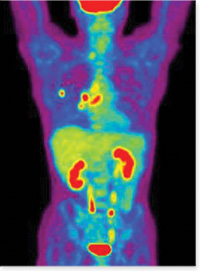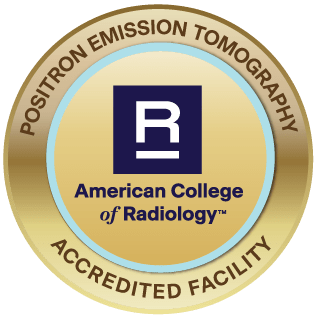- PATIENT PREPARATION
- What is PET-CT?
- What is FDG?
- When is PET-CT used?
- Are there risks associated with PET-CT?
- Clinical Case Studies
- What to bring to the PET-CT scan appointment
- Why coming to the appointment on time is very important
- What to expect during and after the scan
- Study results
- Scheduling, Referrals & Insurance Coverage
PET-CT
What is PET-CT?
Positron Emission Tomography or PET is a special Nuclear Medicine test used to measure changes in the body that are associated with many diseases. PET-CT provides information about metabolic or body process changes which may occur before changes in anatomy. The metabolic information from the PET and the anatomic data from the CT combine to help best locate any lesions in the body. The CT scan works to bring together the data. It does not function as a full diagnostic CT scan. The CT scan is usually performed first and then followed-up, with a separate PET-CT exam.
What is FDG?
FDG, or F-18 fluorodeoxyglucose, is a radioactive tracer. This tracer is a form of glucose, or sugar which is injected before the PET-CT scan. The PET-CT scanner will show how the body is utilizing the radioactive glucose. If there is a specific disease, the glucose may highlight or take up more glucose in the diseased area than in other parts of the body. Physicians can then determine how to best treat those areas.
When is PET-CT used?
PET-CT is very accurate in showing the presence or spread of many malignant tumors. For example, it is more accurate in detecting the spread of non-small cell lung cancer and recurrent colon cancer than any other imaging method currently available. A high degree of accuracy has also been determined in evaluating lymphoma, melanoma, recurrent breast cancer, esophageal cancer, ovarian cancer, recurrent brain cancer, and tumors of the head and neck. Specific applications of PET-CT are:
- Tumor Detection - Initial Diagnosis and Recurrent Disease
- Differentiating Malignant from Benign Tissue
- Evaluating the Entire Body to Determine the Extent of Disease
- Evaluating if a Tumor is Responding to Treatment
-
PET-CT has shown a high degree of accuracy for determining the
presence or spread of many malignant tumors.
- Lung Cancer
- Ovarian Cancer
- Breast Cancer
- Lymphomas
- Head & Neck Cancer
- Colorectal Cancer
- Melanoma
- Brain Cancer
- Pancreatic Cancer
- Esophageal Cancer
- Brain tumor grading: recurrent tumor vs. radiation necrosis.
- Epilepsy: detection of foci, support of surgery.
- Dementia: differentiation of dementia, Alzheimer’s, Huntington’s chorea.
Are there risks associated with PET-CT?
A PET-CT scan is similar to other diagnostic tests such as CT or MRI. The potency of the radiotracer is similar to what patients receive for CT. The radiopharmaceutical used for PET-CT does not remain in the patient’s body very long, so there is no reason to avoid other people once the scan is completed.
Clinical Case Studies
Please click on the case study you would like to see (PDF)
What to bring to the PET-CT scan appointment
- The written referral from the referring physician.
- Any previous CT, MRI, and PET-CT films and reports. The referring physician may arrange to have these sent to University Radiology directly or have the patient bring them with them on the day of the scan.
Why coming to the appointment on time is very important
The PET-CT scan appointment time is carefully chosen to insure that the radiotracers are as fresh as they need to be to obtain an accurate study. If the patient cannot arrive on time or needs to reschedule the appointment, please call us right away at 732.390.0033, and we will give further instructions.
What to expect during and after the scan
- When the patient arrives at our center, they will be asked to complete a history questionnaire.
- We will then check the patient’s glucose (sugar) level. If this level is normal, the patient will then receive a small amount of radioactive glucose in the arm. There will be no side-effects from the injected radiotracer. The patient will feel fine.
- The patient will then wait 30 to 60 minutes while the injected material circulates through the body.
- The patient will then be asked to lie on a table without moving while the scan is taking place. The scan usually takes 30 to 60 minutes to complete. Our technologists will be talking with the patient during the study.
- When the scan is completed, the patient will be free to go home. We encourage the eating and drinking of extra fluids after the scan. The patient may eat or drink whatever they wish.
Scheduling, Referrals & Insurance Coverage
To schedule an appointment, please call University Radiology at 732.390.0033.
We will work to get an appointment time convenient for the patient.
Patients will need to be precertified with their insurance carrier prior to their scan. Our office staff will help with that process.
Coverage by carriers will vary and is changing rapidly as the clinical value and cost-effectiveness of PET-CT is becoming more well-known. If you have questions about insurance coverage and billing, please call us at 732.390.0033, and we will be happy to help you.
- PATIENT PREPARATION
- What is PET-CT?
- What is FDG?
- When is PET-CT used?
- Are there risks associated with PET-CT?
- Clinical Case Studies
- What to bring to the PET-CT scan appointment
- Why coming to the appointment on time is very important
- What to expect during and after the scan
- Study results
- Scheduling, Referrals & Insurance Coverage


